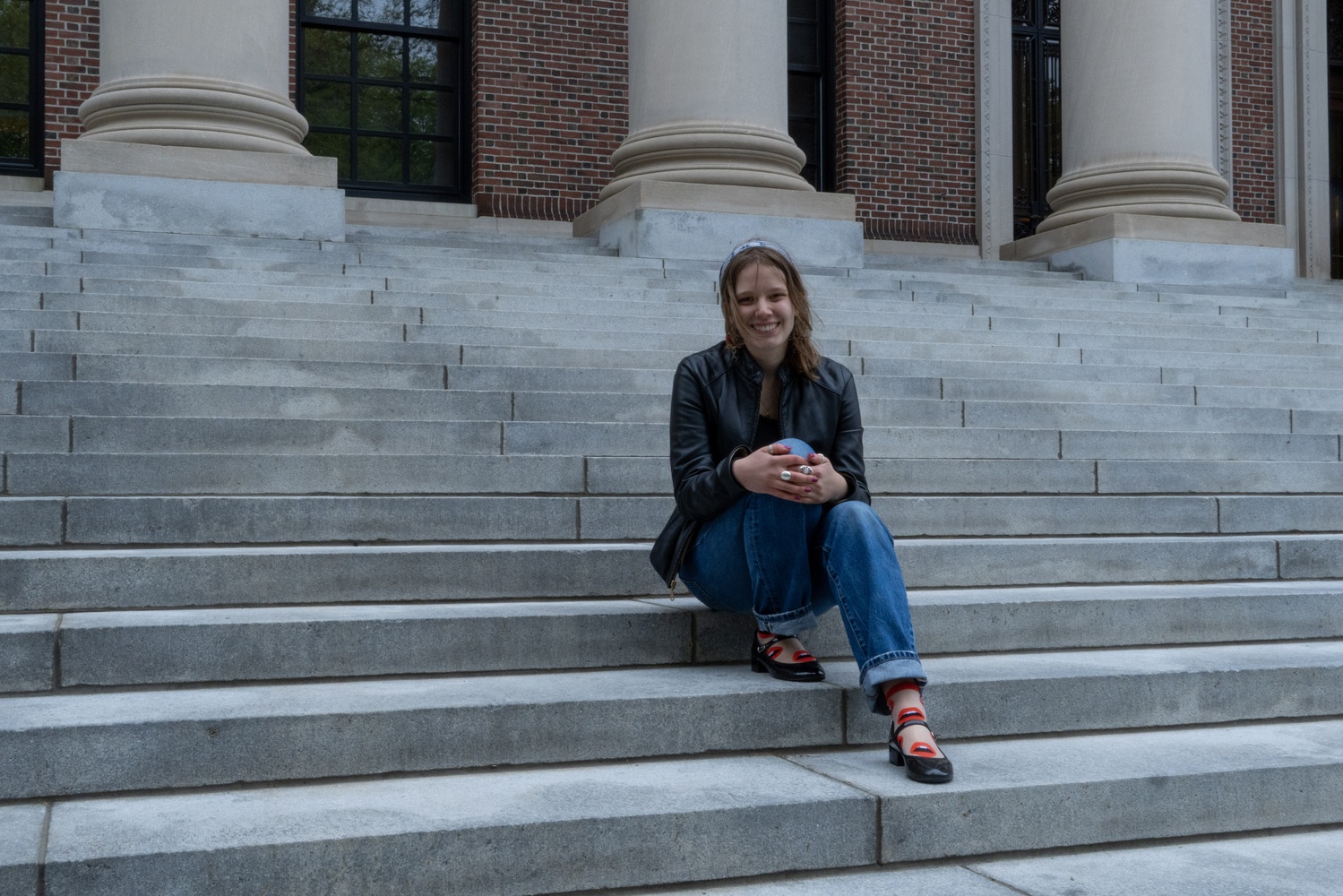
News
Summers Will Not Finish Semester of Teaching as Harvard Investigates Epstein Ties

News
Harvard College Students Report Favoring Divestment from Israel in HUA Survey

News
‘He Should Resign’: Harvard Undergrads Take Hard Line Against Summers Over Epstein Scandal

News
Harvard To Launch New Investigation Into Epstein’s Ties to Summers, Other University Affiliates

News
Harvard Students To Vote on Divestment From Israel in Inaugural HUA Election Survey
Artist Profile: Anika Liv Christensen ’26 on Changing the World One Piece at a Time

“No matter what I do, I’m not going to be able to stop being an artist,” composer and musician Anika Liv Christensen ’26 said in an interview with The Crimson.
Originally from rural New York, Christensen began her music journey at the age of five when she first signed up for her community choir and began piano lessons. Ever since then, music has been a crucial part of her life — from playing the flute in her fourth grade band to now composing her own pieces for voice and instrumentals. Christensen has just finished her junior year at Harvard College, where she studies Music and Human Evolutionary Biology.
Soon after joining the choir and learning the piano, Christensen moved towns and picked up the flute in her school’s band, where she would continue to play the instrument, winning competitions and playing for the New York All-State Symphonic Band. Christensen continued her passion for music in college by joining the Radcliffe Choral Society and writing pieces just for fun.
Through the Radcliffe Choral Society, Christensen applied and was accepted into the Harvard Choruses New Music Initiative, where she was paired up with a professor, Dr. Robert Kyr, to compose music. This is where Christensen began composing the piece “Terragenesis,” which premiered in September of 2024 at Harvard University’s Paine Hall.
“Terragenesis” focuses on her time as a teenager in rural New York surrounded by the isolation of nature. When asked how she completed this piece, Christensen stated that it wasn’t a steady process, but rather, an abrupt one.
“I was just scribbling in my notebook, and I didn’t get anything in class done that day,” Christensen said, referring to the beginning phases of writing the score.
“Terragenesis” took a year-long process before it premiered, performed by the Ensemble Veritas, the choir of the Harvard Choruses New Music Initiative.
When asked about her process, she said that there is no simple process for writing music. For her, she says that progress unfolds “in very inconvenient situations,” recalling the times when she would write in random spurts whenever the music seemed to come to her.
After “Terragenesis,” Christensen composed “Collegium Feminamque Cano,” a three-part treble choir piece premiered by the Radcliffe Choral Society at their 125th anniversary concert. Meanwhile, “Monstrous Gaia” and “The Apocalypse Has Been Scheduled” premiered in the first week of May in New York City and Paine Hall, respectively.
“Collegium Feminamque Cano is more influenced by the role of a historically women’s choir in a more — I don’t want to say male dominated university, because I don’t think we are male dominated, necessarily — but in an environment where women don't necessarily feel like they have as much of a voice,” Christensen said.
She integrates the historical fragments of the choir, raising the voices of women within the space through the piece.
This seems like the consistent rhythm throughout all of Christensen’s pieces. She uses her work to highlight important issues that we as a society should be wary of — her piece “Monstrous Gaia” was inspired by the book “The Nutmeg’s Curse” by Amitav Ghosh.
Ghosh’s book looks at environmental destruction through different lenses by diving into the relationship between capitalism and colonialism and how it specifically relates to the government, which “Monstrous Gaia” takes inspiration from. The piece was commissioned by Filigree Ensemble for their Earth Day concert.
In just the last month, Christensen has premiered three pieces and is looking forward to more. Her passion for composing and writing music can only be described as love. As a full-time student and now composer, Christensen has her schedule packed. However, when asked about the future, she says that she will continue participating in the Harvard Choruses New Music Initiative, writing music and meeting with her mentor. In addition, she is currently considering composing the score for a musical, for which she would be the vocal director as well. Besides that, she is looking to explore more avenues for her career as she continues college, but she does not plan on giving up music anytime soon.
Christensen shared bits of advice for those that want to go into the composing field — especially for young female artists. She highlights the importance of breaking through industry norms by encouraging young women and individuals from marginalized backgrounds to enter the field.
“It’s just a matter of some commitment and a little bit of bravery and openness to feedback,” Christensen said.
She gave encouragement to those who may feel hesitant about entering the field, highlighting the opportunities available at Harvard.
“Apply to the Harvard Choruses New Music Initiative, or take a composition class — or even just write some things for your friends and get a small ensemble together and perform it at Arts First or something,” Christensen said.
So what’s next for Christensen?
As Christensen starts her final year here at Harvard, she’ll continue to write music. Whether you are interested in composition or want to discover a new artist, Christensen is an up-and-coming musician to check out as she uses her pieces to reflect on issues of women’s representation, environmental change, and the field of composition itself.
Want to keep up with breaking news? Subscribe to our email newsletter.
